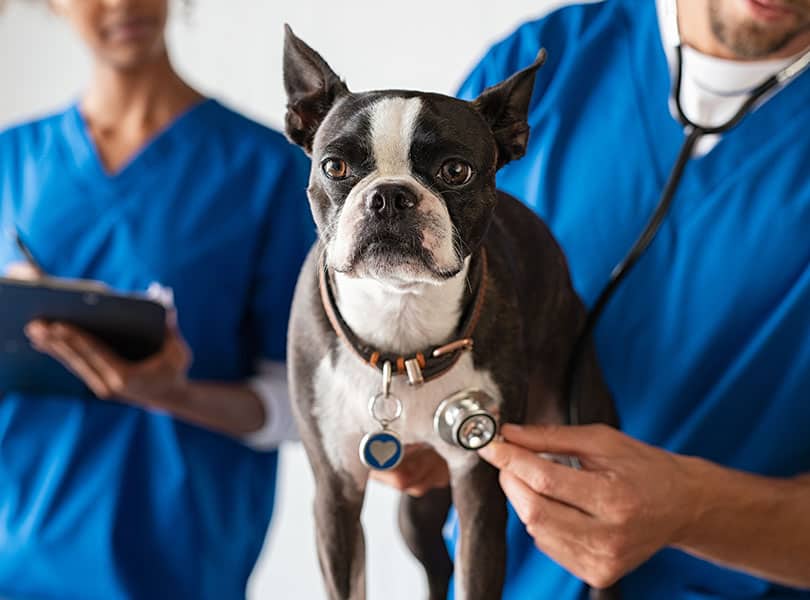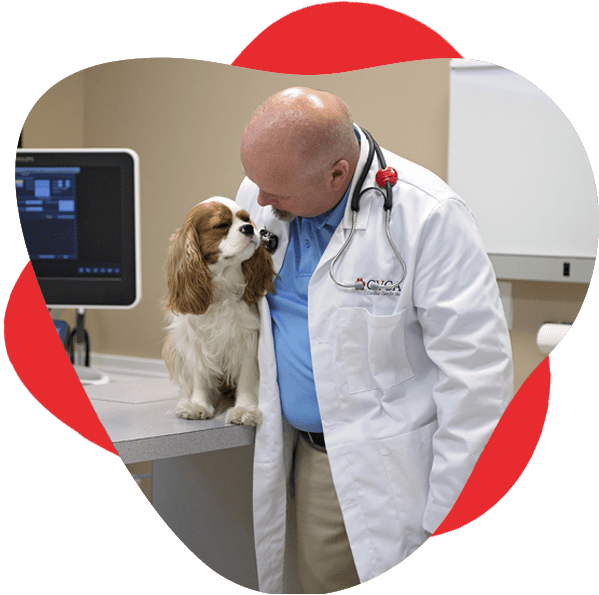Exploring the Crucial Services Supplied by a Veterinary Cardiologist: Understanding Ultrasound and CT Check Techniques
Vet cardiologists play an important role in the wellness of animals by diagnosing and treating various heart disease. They utilize advanced imaging strategies, such as cardiac ultrasound and CT scans, to give precise analyses. Each technique has its unique benefits and applications. Understanding these techniques is crucial for family pet owners looking for the best care for their buddies. What factors should pet owners take into consideration when choosing in between these diagnostic devices?

The Function of Vet Cardiologists in Pet Dog Healthcare
Veterinary cardiologists play a crucial duty in the medical care of pet dogs, concentrating especially on detecting and treating heart-related conditions. They have specialized training that permits them to interpret intricate diagnostic tests and determine different cardio concerns. These specialists make use of advanced techniques, such as echocardiography and electrocardiography, to assess heart feature and framework accurately.Veterinary cardiologists likewise establish tailored treatment strategies that might include medications, way of living adjustments, and, sometimes, surgical interventions. Their competence reaches informing pet proprietors about heart health, emphasizing the importance of normal exams and early discovery of prospective issues. Collaboration with general vets is essential, as it assures detailed look after pets with believed cardiac issues. By supplying specialized services, veterinary cardiologists greatly improve the lifestyle for pet dogs and supply peace of mind for their proprietors, reinforcing the relevance of heart health and wellness in total family pet wellness.
Common Heart Problems in Pet Dogs
Usual cardiac issues in pet dogs can considerably impact their health and top quality of life. Heart murmurs, various kinds of cardiomyopathy, and congenital heart issues are amongst the most widespread conditions that vets come across. Ultrasound For Dogs. Understanding these problems is essential for family pet proprietors to guarantee prompt medical diagnosis and appropriate therapy
Heart Murmurs in Pets
Heart murmurs can be a source of problem for pet proprietors, they are not always a sign of serious wellness issues. A heart murmur is an unusual audio produced by unstable blood circulation within the heart. In pet dogs, these murmurs can be triggered by different variables, consisting of congenital heart problems, shutoff issues, and even stress and anxiety during exams. Many pets with heart murmurs lead typical lives without substantial wellness impacts. To figure out the underlying reason, vet cardiologists often employ diagnostic techniques such as echocardiograms and Doppler ultrasounds. Early detection and assessment are necessary, as they might help manage any type of possible heart problems successfully. Pet proprietors are motivated to consult their veterinarian for a thorough evaluation if a heart whispering is identified.
Cardiomyopathy Kind Explained
Cardiomyopathy encompasses a group of diseases affecting the heart muscle mass, causing endangered cardiac function in animals. One of the most typical types consist of expanded cardiomyopathy (DCM), hypertrophic cardiomyopathy (HCM), and restrictive cardiomyopathy (RCM) DCM largely impacts dogs, creating the heart to damage and enlarge, which decreases its capacity to pump blood successfully. In contrast, HCM is more common in pet cats, identified by the thickening of the heart walls, typically leading to obstructed blood flow. RCM, though less common, occurs when the heart muscular tissue ends up being stiff, limiting its ability to full of blood. Each kind offers special difficulties in medical diagnosis and treatment, necessitating specialized veterinary cardiological evaluation to assure peak administration and care for influenced animals.
Hereditary Heart Issues
Hereditary heart problems stand for a significant group of cardiac problems in family pets, unique from obtained conditions such as cardiomyopathy - Board Certified Veterinary Cardiologist. These flaws are structural irregularities existing at birth, influencing the heart's typical feature. Usual types consist of license ductus arteriosus, ventricular septal defects, and pulmonic stenosis. Signs and symptoms may differ commonly, varying from moderate to severe, and can include exercise intolerance, coughing, and problem breathing. Early diagnosis via sophisticated imaging methods like ultrasound is essential for efficient administration. Vet cardiologists play an essential duty in determining these conditions and suggesting proper therapy options, which might consist of clinical management or medical treatment. Identifying genetic heart defects enables for better end results and enhanced top quality of life for affected family pets
Understanding Cardiac Ultrasound: Just How It Works
A considerable variety of veterinary methods currently utilize heart ultrasound as an essential diagnostic tool for evaluating heart health and wellness in pets. This non-invasive strategy uses high-frequency acoustic waves to develop pictures of the heart's framework and feature. During the procedure, a vet technician uses a gel to the pet's breast and uses a transducer to discharge ultrasound waves. These waves jump off the heart and bordering frameworks, producing real-time pictures on a monitor.Veterinarians can examine various elements of cardiac health and wellness, including chamber size, wall movement, Learn More and shutoff feature. Additionally, cardiac ultrasound enables the discovery of problems such as liquid accumulation and congenital heart problems. This method is crucial for detecting conditions that might not be noticeable with common radiographs. By supplying comprehensive details concerning the heart's composition and performance, heart ultrasound aids in formulating effective therapy prepare for pets experiencing cardiovascular disease.
The Importance of CT Scans in Diagnosing Heart Conditions
How do CT scans improve the diagnosis of heart problems in veterinary medicine? CT scans give in-depth cross-sectional photos of the heart and surrounding frameworks, permitting vets to imagine intricate anatomical partnerships. This imaging method is particularly advantageous in recognizing congenital heart issues, cardiac lumps, and problems in blood vessels. By utilizing advanced imaging formulas, CT scans can analyze heart chamber dimensions and function, using an extensive sight that may be challenging to achieve with traditional methods.Additionally, CT angiography can envision blood circulation and determine areas of constriction or blockage, which is essential for preparing possible treatments. The speed and accuracy of CT scans likewise help with fast medical diagnoses, important in emergency situation situations. Eventually, the unification of CT scans into vet cardiology substantially enhances the accuracy of diagnoses, allowing targeted therapy strategies and improving client end results for pets experiencing heart problems.
Contrasting Ultrasound and CT Scan Techniques
While both ultrasound and CT scans are vital devices in vet cardiology, they supply distinct advantages and limitations that influence their usage in identifying heart problems. Ultrasound, or echocardiography, gives real-time imaging of the heart's framework and function, permitting vets to analyze heart chambers, valves, and blood circulation. It is particularly efficient for examining conditions like heart disease and cardiomyopathy. However, ultrasound might be restricted in visualizing certain anatomical structures due to patient size or obesity.In comparison, CT scans offer thorough cross-sectional pictures of the see this heart and bordering cells, making them optimal for identifying structural abnormalities, tumors, or vascular issues. Although CT scans give comprehensive insights, they need sedation and might entail radiation exposure. Eventually, the choice in between ultrasound and CT checks relies on the details clinical scenario, the individual's condition, and the details needed for an accurate medical diagnosis.
Treatment Options Available Via Veterinary Cardiology
Veterinary cardiology supplies an array of treatment options customized to attend to different heart conditions in pets. Treatment plans commonly begin with way of living adjustments, consisting of diet plan changes and exercise adjustments, aimed at improving total heart health and wellness. Drugs play an important duty, with cardiologists recommending drugs such as diuretics, beta-blockers, and ACE inhibitors to boost and handle signs cardiac function.In more extreme instances, interventional procedures, such as balloon valvuloplasty or stent placement, may be essential to relieve obstructions or enhance blood flow. For specific congenital heart problems, medical choices may be explored to deal with architectural issues. Furthermore, recurring monitoring and follow-up care are crucial components of a complete therapy plan, permitting prompt adjustments based on the pet's feedback to treatment. In general, vet cardiology concentrates on giving effective, personalized care to maximize the wellness and well-being of pet clients with heart disease.
Exactly how to Prepare Your Pet for a Cardiac Evaluation
Preparing a family pet for a heart examination is necessary to assure precise outcomes and a smooth procedure. Proprietors need to initially schedule the appointment with the veterinary cardiologist and review any type of details requirements or problems. It is recommended to keep food for at the very least 12 hours prior to the analysis, as this aids boost imaging top quality during procedures like ultrasound or CT scans.Additionally, keeping a calm atmosphere on the day of the consultation can help in reducing the animal's anxiety. It is beneficial to bring along any kind of pertinent medical records, including previous tests and medicines (Board Certified Veterinary Cardiologist). Owners should additionally make sure that their animal is comfy and leashed throughout transport to the facility. Acquainting themselves with the assessment procedure can help and minimize fears in asking educated inquiries throughout the appointment. By complying with these steps, proprietors can add substantially to the effectiveness of the cardiac evaluation
Frequently Asked Questions
For how long Does a Heart Ultrasound or CT Scan Take?
The period of a heart ultrasound generally varies from 30 to 60 minutes, while a CT check may take about 15 to half an hour. Aspects such as the individual's condition can affect these time quotes.

Exist Any Type Of Dangers Associated With These Analysis Treatments?

Can I Keep With My Family Pet During the Procedure?
The vet center's policy normally determines whether animal proprietors can remain during treatments. While some centers encourage proprietor existence for comfort, others may require separation to guarantee safety and ideal problems for analysis imaging.
Exactly how Much Do These Analysis Examinations Commonly Price?
The expenses of analysis tests, such as ultrasound and CT scans, normally differ based upon place and facility. Typically, rates range from a couple of hundred to over a thousand dollars, mirroring the complexity and modern technology included.
What Is the Recuperation Refine After a Cardiac Assessment?
The healing process after a cardiac assessment includes checking the animal for any kind of prompt responses, making certain convenience, and restricting exercise. Veterinarians normally give post-evaluation directions to lead animal proprietors during this vital recuperation period. Heart whisperings, different types of cardiomyopathy, and congenital heart issues are amongst the most prevalent problems that vets run into. A heart whispering is read here an unusual sound generated by turbulent blood circulation within the heart. Cardiomyopathy includes a group of conditions affecting the heart muscle mass, leading to endangered heart function in animals. Genetic heart issues represent a substantial classification of heart problems in family pets, distinctive from gotten conditions such as cardiomyopathy. Ultrasound, or echocardiography, offers real-time imaging of the heart's structure and feature, enabling veterinarians to evaluate heart chambers, valves, and blood circulation.